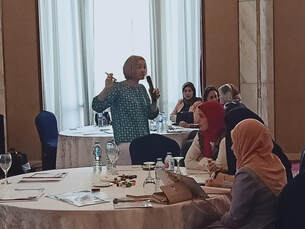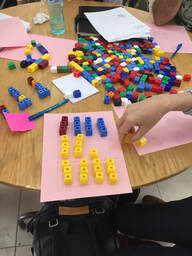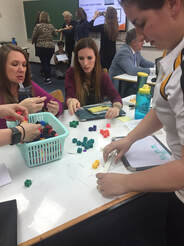All Mathematique workshops are interactive and involve participants ‘doing mathematics’. They are professionally facilitated to move teachers forward in their practice while providing opportunities to reflect on and connect with the work they are currently doing. This list is not exhaustive as personalized workshops can be tailored to your school’s individual needs. Contact Nicole for more information.
Building Mathematical Fluency through Routines and Games (K-8)
How do students develop number sense and fluency? What daily routines can teachers incorporate into their classrooms to ensure all learners are moving towards fluency? In this workshop, teachers will understand what being fluent in mathematics means. They will explore existing routines and games that can be used to build fluency. They will also create their own routines and games that can be used in the classrooms immediately.
How do students develop number sense and fluency? What daily routines can teachers incorporate into their classrooms to ensure all learners are moving towards fluency? In this workshop, teachers will understand what being fluent in mathematics means. They will explore existing routines and games that can be used to build fluency. They will also create their own routines and games that can be used in the classrooms immediately.

Problem Solving in the Mathematics Classroom (PK-12)
Why is it important for teachers to build their instruction around a good problem? What makes a good mathematical problem? Why is problem-solving such a critical tool for learners of all ages? This workshop explores the answers to these questions by engaging teachers in true mathematical problem solving opportunities. As they move through the work, teachers will experience the beauty and power of problem solving. They will leave with a robust understanding of what problem solving looks like and how they can immediately incorporate it into their daily instructional practices.
Why is it important for teachers to build their instruction around a good problem? What makes a good mathematical problem? Why is problem-solving such a critical tool for learners of all ages? This workshop explores the answers to these questions by engaging teachers in true mathematical problem solving opportunities. As they move through the work, teachers will experience the beauty and power of problem solving. They will leave with a robust understanding of what problem solving looks like and how they can immediately incorporate it into their daily instructional practices.
Mathematical Play in the Early Years Classroom (Early Years)
Early years teachers lay the foundation upon which all further study of mathematics lies. This workshop explores how mathematical play can best be incorporated into the early years. Teachers will play with mathematics using manipulatives, games, 5 and 10 frames, dot talks, and other age-appropriate tools that will enrich and deepen their practice. Teachers will also see how play is used to build the foundations of number sense in early year students.
Early years teachers lay the foundation upon which all further study of mathematics lies. This workshop explores how mathematical play can best be incorporated into the early years. Teachers will play with mathematics using manipulatives, games, 5 and 10 frames, dot talks, and other age-appropriate tools that will enrich and deepen their practice. Teachers will also see how play is used to build the foundations of number sense in early year students.

Using Manipulatives to Build a Conceptual Understanding of Mathematics (K-8)
Manipulatives are the key element to building a student’s conceptual understanding of mathematics. Many teachers are unaware that complex topics in mathematics can be developed using manipulatives. Teachers will use Cuisenaire Rods, Base 10 blocks, Unifix cubes, and pattern blocks to develop their own conceptual understanding of addition, subtraction, multiplication, and division of whole numbers, fractions, and decimals. They will leave this workshop with a robust appreciation of how crucial manipulatives are to fully develop students’ conceptual understanding of mathematical operations.
Manipulatives are the key element to building a student’s conceptual understanding of mathematics. Many teachers are unaware that complex topics in mathematics can be developed using manipulatives. Teachers will use Cuisenaire Rods, Base 10 blocks, Unifix cubes, and pattern blocks to develop their own conceptual understanding of addition, subtraction, multiplication, and division of whole numbers, fractions, and decimals. They will leave this workshop with a robust appreciation of how crucial manipulatives are to fully develop students’ conceptual understanding of mathematical operations.
Understanding the Progression of the Mathematics Standards. (PK-8)
Whether your school is using the Common Core State Standards, the National Curriculum in England, or the PYP/MYP Mathematics Frameworks, teachers need a thorough understanding of the horizontal and vertical alignment of the standards. In this workshop, participants work in grade level clusters to examine the alignment of their school's adopted standards. Teachers will then come together as a whole group to share the vertical progression of the standards from KG though middle school. Teachers will leave this session with an understanding of and how and why mathematical concepts are developed over time.
Whether your school is using the Common Core State Standards, the National Curriculum in England, or the PYP/MYP Mathematics Frameworks, teachers need a thorough understanding of the horizontal and vertical alignment of the standards. In this workshop, participants work in grade level clusters to examine the alignment of their school's adopted standards. Teachers will then come together as a whole group to share the vertical progression of the standards from KG though middle school. Teachers will leave this session with an understanding of and how and why mathematical concepts are developed over time.

Exploring the Beauty and Power of Mathematical Storytelling (PK-12)
Everyone loves a good story. For thousands of years, stories have been used in part to pass down information to younger generations; provide entertainment; convey joy, sadness, or teach a life lesson. Stories and storytelling are integral to the human experience. In 2020, stories that our students relate to are often told through a 30-second TikTok video. This workshop explores how math teachers can tap into the natural beauty and power of storytelling to enhance their students’ mathematics learning experiences. Teachers will leave with their own mathematical autobiographies and sample tasks that they can use in their classrooms immediately.
Assessing Student Understanding of Mathematics (K-12)
This workshop explores both formative and summative assessment in the mathematics classroom. What types of questions are teachers asking of their students? What types of tasks are students engaging with to demonstrate their learning? Teachers will explore Webb’s Depth of Knowledge (DOK) as it applies to mathematical tasks. They will engage with formative and summative assessments at a variety of different grade levels. Finally, they will create their own rich mathematical tasks.
Everyone loves a good story. For thousands of years, stories have been used in part to pass down information to younger generations; provide entertainment; convey joy, sadness, or teach a life lesson. Stories and storytelling are integral to the human experience. In 2020, stories that our students relate to are often told through a 30-second TikTok video. This workshop explores how math teachers can tap into the natural beauty and power of storytelling to enhance their students’ mathematics learning experiences. Teachers will leave with their own mathematical autobiographies and sample tasks that they can use in their classrooms immediately.
Assessing Student Understanding of Mathematics (K-12)
This workshop explores both formative and summative assessment in the mathematics classroom. What types of questions are teachers asking of their students? What types of tasks are students engaging with to demonstrate their learning? Teachers will explore Webb’s Depth of Knowledge (DOK) as it applies to mathematical tasks. They will engage with formative and summative assessments at a variety of different grade levels. Finally, they will create their own rich mathematical tasks.
